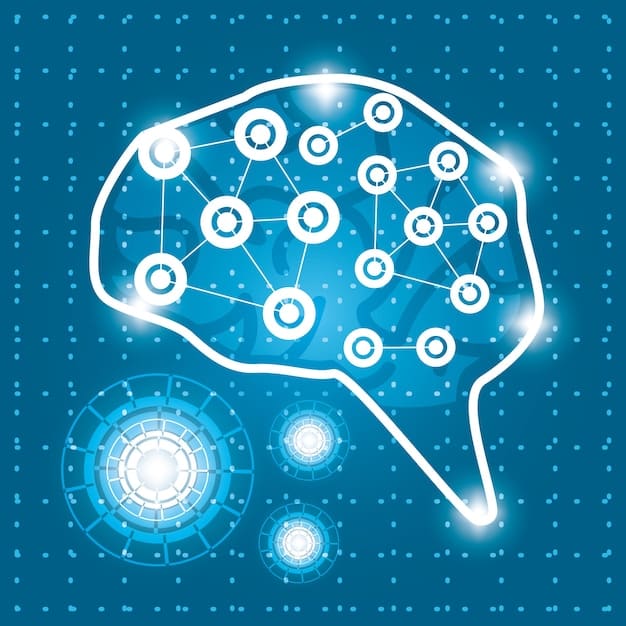Mastering Emotional Intelligence: 7 Skills for Success in 2025

Mastering emotional intelligence in 2025 involves cultivating seven essential skills: self-awareness, self-regulation, motivation, empathy, social skills, adaptability and resilience, which are crucial for navigating personal and professional landscapes, fostering strong relationships, and achieving sustainable success.
In an increasingly interconnected and dynamic world, mastering emotional intelligence: 7 essential skills for personal and professional success in 2025 is no longer a soft skill, but a core competency. As we navigate the complexities of modern life, understanding and managing our emotions, as well as recognizing and responding to those of others, becomes paramount.
The Significance of Emotional Intelligence in 2025
Emotional intelligence (EQ) has emerged as a critical factor in both personal and professional realms. It goes beyond traditional measures of intelligence (IQ) to encompass the ability to perceive, understand, manage, and utilize emotions effectively.
The importance of EQ is projected to surge in 2025. Here’s why:
Increased Automation and AI
As automation and artificial intelligence (AI) continue to transform industries, the demand for uniquely human skills is set to increase. EQ distinguishes humans from machines.
Globalization and Diversity
With globalization blurring geographical boundaries, the ability to navigate diverse cultural landscapes and effectively communicate with people from different backgrounds becomes crucial. EQ plays a pivotal role in fostering inclusive environments and resolving intercultural conflicts.
Enhanced Leadership and Teamwork
Effective leaders, who inspire, motivate, and guide their teams. Emotional intelligence is indispensable for building trust, resolving conflicts, and fostering collaboration within the workplace.
Self-awareness:Identify and understand your own emotions.Self-regulation:Manage and control your feelings effectively.Empathy:Recognize and understand the emotions of others.Social skills:Build and maintain healthy relationships.
Emotional intelligence is poised to play a vital role in shaping success in 2025. By cultivating these essential skills, individuals can enhance their personal well-being, and contribute to harmonious and productive work environments.

Skill 1: Cultivating Self-Awareness
Self-awareness forms the bedrock of emotional intelligence. It’s the capacity to recognize and understand your own emotions, strengths, weaknesses, values, and motivations.
Without self-awareness, individuals may struggle to navigate complex situations effectively. Here’s how to cultivate this essential skill:
Journaling and Reflection
Regular journaling provides a valuable avenue for exploring your thoughts, feelings, and behaviors. Reflecting on past experiences, both positive and negative, can offer insights into patterns of emotional response and triggers.
Seeking Feedback
Actively solicit feedback from trusted colleagues, friends, or mentors. Constructive feedback can help you identify blind spots, gain different perspectives, and improve your self-perception.
Mindfulness Practices
Engage in mindfulness exercises, focus on the present moment without judgment. It can enhance your awareness of thoughts and emotions. It promotes a deeper understanding of yourself.
- Practice daily meditation.
- Pay attention to physical sensations like breathing and heartbeat.
- Observe your thoughts and emotions without reacting.
Self-awareness empowers individuals to make informed decisions. It improves relationships and leads a more fulfilling life. This skill is critical for navigating the challenges and opportunities that lie ahead.
Skill 2: Mastering Self-Regulation
Self-regulation is the skill to manage and control your emotions and impulses effectively. It requires emotional discipline, adapting to changing circumstances, and responding thoughtfully rather than impulsively.
Self-regulation is an essential skill for sustained personal and professional success. Here’s some steps to mastering self-regulation:
Identify Triggers
Begin by identifying the situations, people, or events that tend to provoke strong emotional reactions. Recognizing your triggers empowers you to anticipate and prepare for these moments.
Develop Coping Strategies
Equip yourself with a toolkit of coping techniques to manage intense emotions when they arise. These strategies may include deep breathing exercises, progressive muscle relaxation, or visualization techniques.
Practice Emotional Delay
Cultivate the habit of pausing before reacting in emotionally charged situations. Taking a moment to collect your thoughts and consider the potential consequences of your actions can prevent impulsive decisions.
Self-regulation enables individuals to navigate conflicts constructively, maintain composure under pressure, and build strong relationships. People with the ability to manage their emotions are more likely to achieve goals.

Skill 3: Harnessing the Power of Motivation
Motivation fuels goal pursuit, and shapes resilience when facing challenges. Individuals with internal motivation demonstrate greater initiative, persistence, and commitment.
Here’s how to ignite and sustain your motivation:
Set Meaningful Goals
Define clear, specific, and measurable goals that align with your values, and passions. Meaningful goals provide a sense of direction, and purpose, helping you stay motivated thru obstacles.
Cultivate a Growth Mindset
Embrace a growth mindset, view challenges and setbacks as opportunities for learning and growth. Focus on effort, perseverance, and skill development.
Practice Self-Encouragement
Become your own cheerleader, and offer positive reinforcement and encouragement. Celebrate small victories. Remind yourself of your strengths, abilities, and past accomplishments.
- Set achievable milestones along the way.
- Reward yourself for progress and achievements.
- Stay focused on benefits of reaching your goals.
By harnessing the power of motivation, individuals can overcome obstacles, achieve goals, and unlock their full potential. This skill is indispensable.
Skill 4: Empathy and Its Importance
Empathy involves understanding and sharing the feelings of others. It requires actively listening, putting yourself in another’s shoes, and recognizing their thoughts, and perspectives.
In 2025, empathy is a cornerstone of effective communication, collaboration, and leadership. Here’s how:
Practice Active Listening
Give others your full attention, and focus on understanding their message from their point of view. Pay attention to verbal cues, body language, and tone of voice.
Seek to Understand
Make a conscious effort to understand others, even when you disagree. Ask questions, seek clarification, and avoid making assumptions or judgments.
Show Compassion and Support
Offer compassion, and support to those who are struggling. Acknowledge their feelings, validate their experiences, and offer practical assistance whenever possible.
Empathy fosters trust, strengthens relationships, and promotes effective teamwork. Empathy is vital for creating inclusive, supportive, and productive environments.
Skill 5: Developing Social Skills
Social skills encompass the ability to communicate effectively, build rapport, navigate social situations with grace, and resolve conflicts constructively.
Here’s how to enhance your social skills:
Cultivate Strong Communication Skills
Develop clear language, active listening, and nonverbal communication such as gestures. Adapt your communication style to suit your audience and the context.
Build Rapport and Relationships
Seek opportunities to connect with others which is key to building rapport and creating relationships. Show genuine interest in learning about others.
Navigate Conflict Effectively
Conflict is inevitable in social interactions; however, learn how to manage disagreements. Approach conflicts through open conversation, listening and finding common ground will help find solutions.
- Develop strong communication skills.
- Be respectful and courteous in your interactions with others.
- Seek opportunities to collaborate and network with others.
Social skills are critical for success in both personal and professional life. By cultivating strong interpersonal skills, you can thrive in various settings. This will help foster collaboration.
Skill 6: Embracing Adaptability
Adaptability is the ability to be flexible and resilient also known as dealing with changing circumstances and embracing new opportunities.
In 2025, adaptability is an indispensable skill. The following points highlight how to excel in this area:
Cultivate A Growth Mindset
Maintain a strong belief in the ability to learn new skills. When we believe we can excel we open ourselves to new challenges and develop our skills.
Stay Informed And Curious
Keep abreast of industry trends and developments by reading articles. Pursue new interests and hobbies.
Embrace Lifelong Learning
Commitment to continuously improving yourself is an important skill. When we never stop learning we are always developing our ability to adapt
By embracing adaptability, individuals set themselves up for greater self-awareness. Individuals who maintain focus are better prepared for the opportunities and challenges ahead.
Skill 7: Building Resilience
Resilience describes the capacity to bounce back from adversity, cope with stress, and persevere in the face of challenges.
Here’s how to fortify resilience.
Develop A Strong Support System
Surround yourself with supportive friends, family members, or mentors. Lean on others for emotional support and guidance during times of stress and uncertainty.
Practice Self-Care
Prioritize self-care activities that promote your physical, emotional, and mental well-being. These may include exercise, healthy eating, mindfulness practices, spending time in nature, or pursuing hobbies and interests.
Reframe Negative Thoughts
Challenge negative thought patterns and reframe them in a more positive and empowering light. Focus on gratitude, highlight your strengths, and celebrate small victories.
Resilience enables individuals to overcome obstacles, learn from setbacks, and emerge stronger and more resourceful. By building resilience, individuals can navigate life’s challenges with greater confidence and optimism.
| Key Aspect | Brief Description |
|---|---|
| 🧘 Self-Awareness | Recognizing and understanding your own emotions and how they affect others. |
| 🚦 Self-Regulation | Managing your emotions and impulses effectively, adapting to changing circumstances. |
| 💪 Motivation | Fueling your goals, staying resilient, and maintaining a positive attitude. |
| 🤝 Empathy | Understanding and sharing the feelings of others, fostering deeper connections. |
Frequently Asked Questions
▼
Emotional intelligence (EI) helps you understand, use, and manage your emotions. It can relieve stress, help you communicate better, empathize with others, overcome challenges, and defuse conflict.
▼
Emotional intelligence is not fixed but can be developed and improved. Continuous self-awareness, active learning, and consistent practice are essential. Being open to feedback improves emotional intelligence.
▼
Indicators include strong self-awareness, good self-regulation, empathy, social skills, and resilience. People usually handle stress well and have healthier interpersonal relationships. They easily connect with others as well.
▼
Practicing mindfulness, reflecting on experiences, and seeking feedback from trusted people enhances self-awareness. Journaling and meditation can help you to know how your emotions affect your behavior and mood.
▼
Empathy promotes trust, strengthens teamwork, improves communication, prevents conflicts, and enhances leadership. Showing genuine interest in others fosters respect and cultivates productive environments in personal and work settings.
Conclusion
In conclusion, mastering emotional intelligence: 7 essential skills for personal and professional success in 2025 is paramount. By cultivating self-awareness, self-regulation, motivation, empathy, social skills, adaptability, and resilience, individuals can thrive in an ever-evolving world.





